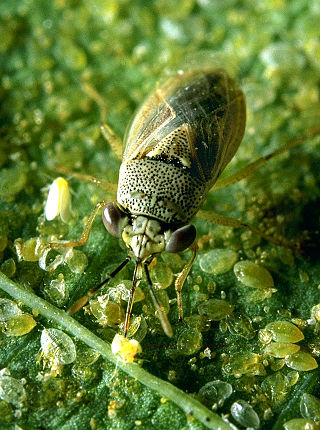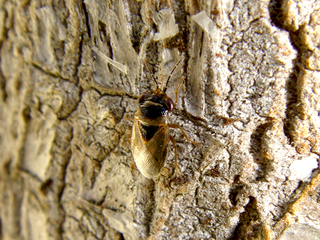
Hemiptera is an order of insects, commonly called true bugs, comprising over 80,000 species within groups such as the cicadas, aphids, planthoppers, leafhoppers, assassin bugs, bed bugs, and shield bugs. They range in size from 1 mm (0.04 in) to around 15 cm (6 in), and share a common arrangement of piercing-sucking mouthparts. The name "true bugs" is often limited to the suborder Heteroptera.

Geocoris is a genus of insects in the family Geocoridae. Commonly known as big-eyed bugs, the species in Geocoris are beneficial predators, but are often confused with the true chinch bug, which is a pest. There are more than 140 described species in Geocoris.

Agabus uliginosus is a species of beetle native to the Palearctic, including Europe, where it is only found in Austria, Belarus, Belgium, Great Britain including Shetland, Orkney, Hebrides and Isle of Man, Croatia, the Czech Republic, mainland Denmark, Estonia, Finland, mainland France, Germany, Hungary, Iceland, mainland Italy, Kaliningrad, Latvia, Lithuania, Luxembourg, mainland Norway, Poland, Romania, Russia, Slovakia, Slovenia, Sweden, Switzerland, the Netherlands, Ukraine and Yugoslavia.
Geocoris pallens, the western big-eyed bug, is a species of big-eyed bug in the family Geocoridae. It is found in Central America, North America, and Oceania.

Geocoridae is a family of big-eyed bugs in the order Hemiptera. There are more than 290 described species in Geocoridae.
Geocoris limbatus is a species of big-eyed bug in the family Geocoridae. It is found in North America.
Geocoris frisoni is a species of big-eyed bug in the family Geocoridae. It is found in North America.
Geocoris floridanus, the Florida big-eyed bug, is a species of big-eyed bug in the family Geocoridae. It is found in North America.
Geocoris howardi is a species of big-eyed bug in the family Geocoridae. It is found in North America.
Geocoris discopterus is a species of big-eyed bug in the family Geocoridae. It is found in North America.
Mixogaster breviventris is a species of syrphid fly in the family Syrphidae.
Geocoris atricolor is a species of big-eyed bug in the family Geocoridae. It is found in North America.
Chrysotoxum chinook is a species of syrphid fly in the family Syrphidae.
Aradus funestus is a species of flat bug in the family Aradidae. It is found in North America.
Aradus depictus is a species of flat bug in the family Aradidae. It is found in North America.
Geocoris bullatus, the large big-eyed bug, is a species of big-eyed bug in the family Geocoridae. It is found in North America.

Geocoris punctipes, the big-eye bug, is a species of big-eyed bug in the family Geocoridae. It is found in the Caribbean, Central America, North America, Oceania, and South America.

Geocoris varius is a species of big-eyed bug in the family Geocoridae, found in eastern Asia.

Geocoris megacephalus is a species of big-eyed bug in the family Geocoridae, found in the Palearctic.







